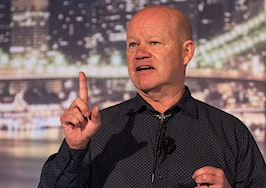Twenty years ago, I hung out for a couple of years on the third floor of the Redwest campus at the Microsoft headquarters in Redmond, Washington, where the software company was dabbling in every imaginable digital venture.
One day, I was meeting with Laura (Bordewieck) Rippy, the product manager for the software company’s secret real estate venture, later dubbed MSN HomeAdvisor.
Recently minted Harvard MBA Ian Morris, who later started Market Leader, was also there, as well as Larry Cohen, who became Bill Gates’ chief of staff.
Then, the always enthusiastic and boyish-looking Rich Barton wandered in. The 28-year old Stanford-trained engineer was cooking up an online travel venture that did not have a name yet, but it came to be called Expedia. In a few years, it wiped out most travel agents.
Ten years later, Barton — along with his Expedia wingman Lloyd Frink — hatched Zillow. Unlike the travel venture, Zillow did not lay claim to the economic livelihood of real estate agents. Just the opposite: The Seattle firm has helped an untold number of agents succeed.
Zillow promotes homeownership and gives the real estate experience a good name, helping millions of homebuyers become delighted while looking for a house. What could be better for an industry that is at times blamed for making homebuying a yucky hustle?
The Zillow founders were savvy enough to know that, if done right, online real estate necessarily must be a marriage of digital and analog (agents).
But instead of receiving an industry award, Zillow is often vilified for something it allegedly is going to do someday — which it tirelessly denies it has any intention of doing and has never done to date — become a FSBO (for sale by owner) site, a broker or a franchise.
Today, complaining about Zillow is like griping about the sun being too bright. Whine all you want, but you can’t do much about it, and it’s a lot better than a cloudy day.
[Tweet “Complaining about Zillow is like griping about the sun being too bright.”]
Zillow did not invent all that much, but it did leverage the early trials and errors of many other online real estate companies to create a more compelling experience for house shoppers.
For the company, the results are impressive. The Seattle-based firm employs 2,300 people, has a market cap in excess of $2.5 billion and generated revenue of an estimated $700 million in 2015. More than 140 million consumers roam its digital properties each month, generating 2 million agent reviews. Barton and Fink hired a crack management team, headed by CEO Spencer Rascoff.
Is Zillow ruthless at times? Yes — consider the ongoing lawsuit surrounding Errol Samuelson’s recruitment. Not always transparent? Yes — the dotloop acquisition was awkwardly opaque. And less-than-perfect with its products? Too many zany Zestimates for sure.
And Zillow did not pioneer alone. Many other companies, including realtor.com, Trulia and Redfin innovated around home search and emphasized the role of agents.
But do not lose site of the bigger narrative in the Zillow history because it is, in many ways, less about what Zillow did to the industry and more about what the industry did to itself.
For more than 10 years, industry leaders have been spouting cliches about “consumer first,” but rarely has the hyperbole translated into meaningful investments that serve online customers.
With a compelling consumer offer, Zillow filled a gaping hole between industry rhetoric and that same industry’s inaction.
[Tweet “Zillow filled a gaping hole between industry rhetoric and that same industry’s inaction.”]
While the big shots have been humbled (even humiliated) by Zillow’s success, the everyday agent continues to be secure in an important role with most real estate sales. In part because the leading consumer real estate brand — Zillow — reinforces the agent’s importance with agent profiles displayed everywhere when millions of home searches are conducted each day.
Zillow built its value on the backs of agents, but it is completely vested in their success.
Far more disruptive online real estate companies are being launched every month — and if the agent is threatened by them, so is Zillow.
Very few outsiders in the last 50 years have invested more in the importance of using agents, in helping to create a dynamic housing market and in promoting the value of owning a home. The industry should stand up and sing happy birthday to this 10-year-old venture with gusto and gratitude.
Editor’s note: Neither Brad Inman, the company Inman nor any of its employees own stock in Zillow, and the Seattle company has no economic interest whatsoever in Inman.





